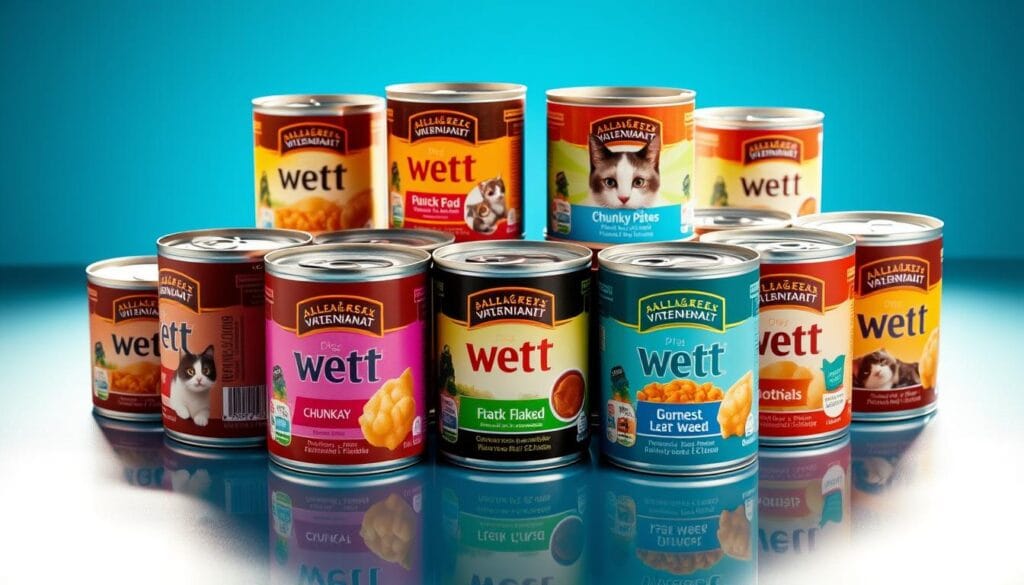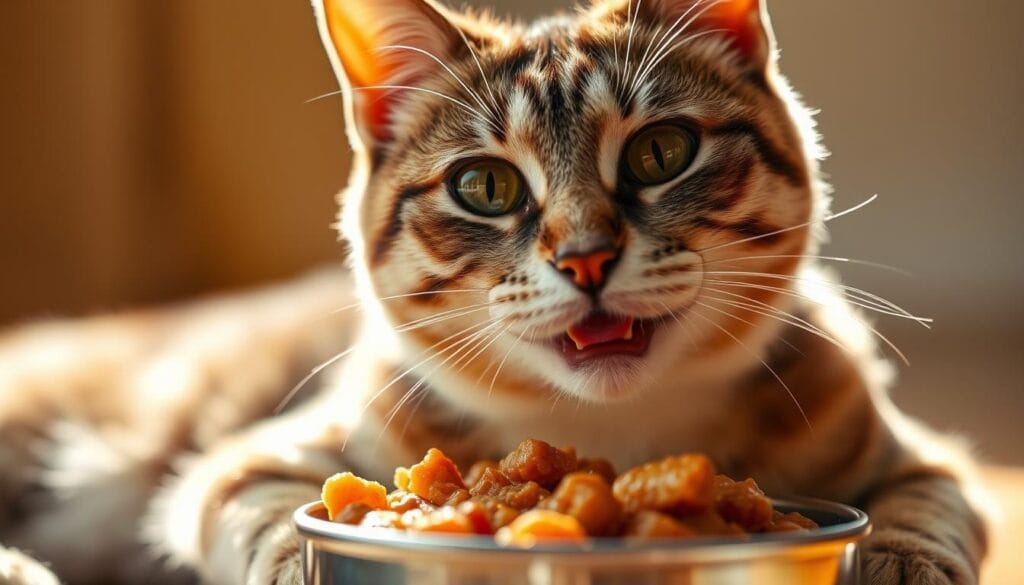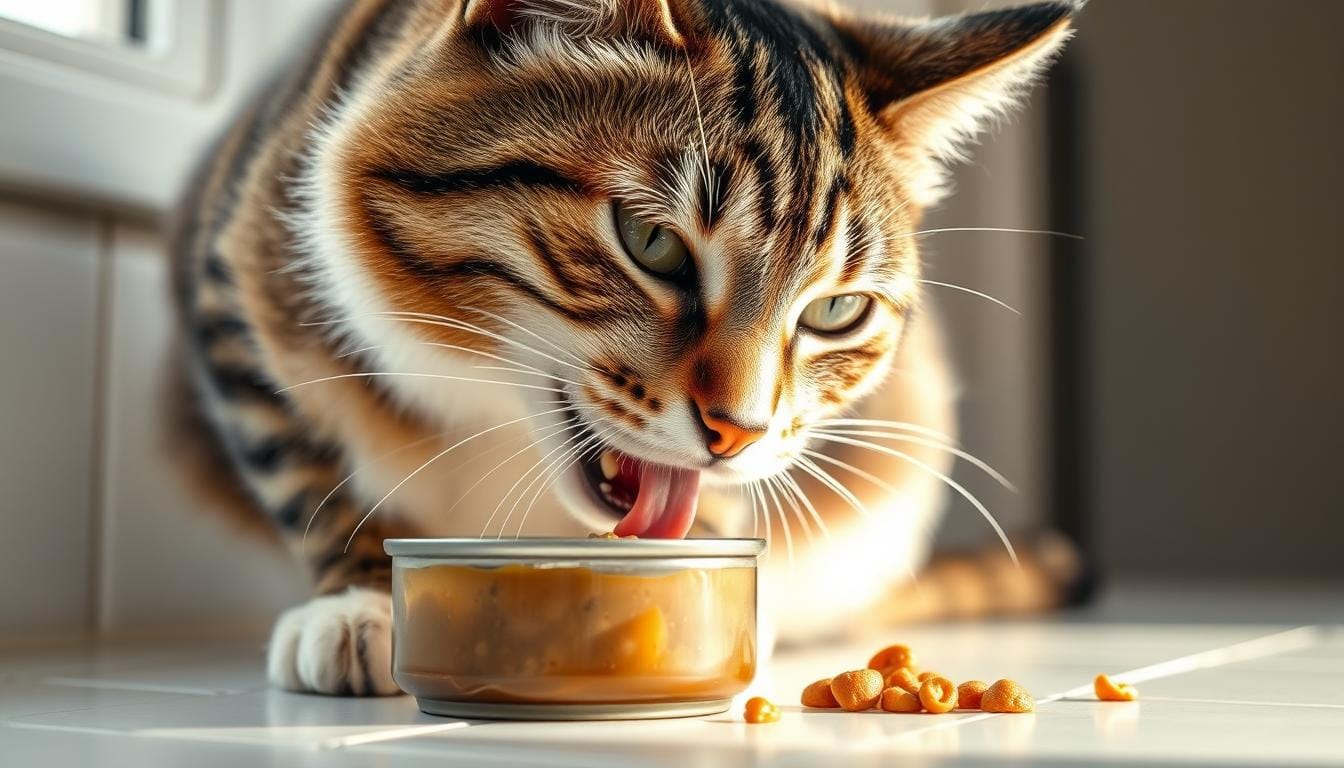Why canned cat food can be better for your cat’s health
Have you ever watched your feline friend lick their bowl clean after a meal? That instant purr of satisfaction speaks volumes. Like you, many pet owners want what’s closest to nature for their companions—because when they thrive, we feel it too.
Table of Contents
Wild ancestors hunted prey rich in moisture and protein. Modern options that mirror this balance often lead to visible improvements in energy and coat shine. Hydration plays a bigger role than you might think—many urinary and kidney issues stem from chronic dehydration.
Veterinarians increasingly highlight the benefits of meat-focused formulas with minimal fillers. These choices support digestion and nutrient absorption, especially for sensitive pets. Imagine fewer hairballs and steadier weight management—all from a simple dietary shift.
Your cat’s well-being starts at the bowl. By prioritizing their biological needs, you’re not just feeding them—you’re giving them a foundation for lasting vitality. Isn’t that what every pet parent wants?
Nutritional Benefits of Canned Cat Food
Ever wonder why some pets seem more vibrant? The secret might be in their meals’ moisture content. Hydration is critical for urinary health and digestion, and many pets struggle to drink enough water independently. This makes moisture-rich formulas essential.
Enhanced Hydration and Digestive Support
Pets naturally absorb water through their diet. High-moisture meals mimic the hydration they’d get from prey in the wild. Soft textures also ease digestion, reducing strain on sensitive stomachs. Fewer hairballs and smoother nutrient absorption often follow.
High-Quality Proteins and Natural Ingredients
Premium options prioritize protein-rich recipes with real meat, organs, and seafood. Brands like ZIWI Peak use 92% ethically sourced ingredients, delivering amino acids for muscle health. No artificial fillers mean cleaner nutrition tailored to carnivorous needs.
When selecting meals, focus on formulas with recognizable components. Balanced moisture and protein create a foundation for energy, coat shine, and long-term vitality. Your pet’s bowl holds the key to their well-being—choose wisely.
Discovering the Variety in Wet Cat Food Styles
Does your pet turn up their nose at certain meals? Texture plays a bigger role in their enjoyment than you might think. Modern wet food offers three primary styles—pâté, chunky, and gravy-based—each catering to different preferences. Matching these options to your companion’s likes can transform mealtime from a chore to a highlight.

Pâté, Chunks, and Gravy Explained
Pâté features a smooth, whipped consistency ideal for pets who dislike lumps. Its uniform texture ensures even flavor distribution, making it a reliable choice for picky eaters. Chunky varieties, on the other hand, include visible meat pieces in thick sauce. These provide a satisfying chew while keeping hydration levels high.
Gravy-style blends smaller meat bits with a soup-like broth. This option works well for pets that lap up liquids or need extra moisture. Rotating between styles prevents boredom and encourages consistent eating habits.
| Style | Texture | Best For |
|---|---|---|
| Pâté | Smooth & whipped | Senior pets, dental issues |
| Chunky | Meat pieces in sauce | Active cats, strong chewers |
| Gravy | Brothy with small bits | Liquid lovers, hydration needs |
Meeting Your Cat’s Texture Preferences
Observe how your pet interacts with their bowl. Do they lick up sauces first or go straight for meaty morsels? Younger animals often prefer chunky textures for engagement, while older ones may favor easy-to-eat pâté. Experimenting with different varieties helps identify their favorites—boosting both nutrition intake and mealtime joy.
Remember: A mix of flavors and textures keeps things exciting. Pair this variety with high-quality ingredients, and you’ll create a dining experience they’ll eagerly anticipate.
Quality Ingredients and Trusted Wet Food Brands
What goes into your pet’s bowl matters more than you think. Trusted brands prioritize clean, purposeful formulas that mirror a carnivore’s natural diet. This means skipping cheap fillers and focusing on what truly nourishes.
Sourcing Ethical, High-Protein Meats
Premium options start with responsibly raised proteins like chicken, beef, and seafood. Brands partner with suppliers who prioritize animal welfare and sustainable practices. For example, free-range poultry and grass-fed beef ensure higher nutrient density in every bite.
These protein-rich meats deliver amino acids essential for muscle tone and energy. Ethical sourcing also means fewer antibiotics or artificial additives—just pure, digestible nutrition tailored to your pet’s needs.
Grain-Free and Nutrient-Dense Recipes
Grain-free wet formulas remove common irritants like corn, wheat, and soy. Instead, they pack meals with concentrated proteins, vitamins, and moisture. This approach supports:
- Healthier digestion due to fewer starchy fillers
- Shinier coats from omega fatty acids
- Lean body mass through calorie-efficient meals
Recipes often blend chicken or beef with nutrient boosters like pumpkin or blueberries. Smaller portions provide big nutritional payoffs, making every spoonful count. Plus, wheat and gluten-free ingredients cater to sensitive stomachs.
By choosing grain-free wet options, you’re offering meals designed by pet parents who understand what true vitality looks like. It’s not just food—it’s fuel for a thriving life.
Why You Should Choose canned cat food for Your Pet
Your companion’s vitality starts with what’s in their bowl. Moisture-rich meals mirror the hydration levels of natural prey, addressing biological needs that dry alternatives often overlook. This alignment with instinctual eating patterns fosters visible improvements in energy, coat quality, and long-term wellness.

Supporting Overall Health
Heart health thrives with balanced sodium and taurine levels found in premium wet formulas. These nutrients maintain strong cardiac function, especially as pets age. Omega fatty acids also promote circulation and reduce inflammation.
Digestive systems benefit from soft textures that ease nutrient absorption. Sensitive stomachs experience less strain, leading to fewer hairballs and smoother digestion. High-quality proteins break down efficiently, maximizing energy from every meal.
Bone strength relies on precise calcium-to-phosphorus ratios. Moisture-rich options often include these minerals in bioavailable forms, supporting skeletal integrity. This is crucial for active pets and seniors alike.
Kidney function improves with increased hydration. Many urinary issues stem from chronic dehydration, which wet formulas actively combat. Regular intake helps flush toxins and maintain organ health.
Brands like ZIWI Peak craft recipes that blend taste and nutrition seamlessly. Their grain-free, protein-focused meals eliminate fillers while delivering the textures pets crave. Rotating flavors keeps mealtime exciting while meeting dietary requirements.
By prioritizing species-appropriate nutrition, you’re investing in fewer vet visits and more playful years. It’s not just about feeding—it’s about nurturing resilience from the inside out.
Practical Feeding, Serving, and Storage Guidelines
A consistent routine transforms good nutrition into lasting health. Tailoring meals to your pet’s life stage and habits ensures they get the most from every bite while reducing waste.
Matching Portions to Life Stages
Age, weight, and activity level dictate ideal serving sizes. Younger animals require frequent meals to fuel growth, while seniors benefit from smaller, easier-to-digest portions.
| Life Stage | Daily Servings | Portion Size | Key Benefit |
|---|---|---|---|
| Kitten | 3-4 | 1/4 cup | Supports rapid development |
| Adult | 2 | 1/2 cup | Maintains energy balance |
| Senior | 2-3 | 1/3 cup | Eases digestion |
Preserving Freshness Safely
Opened containers demand careful handling. Always refrigerate unused portions in airtight containers—exposure to air accelerates spoilage. Discard leftovers after 5 days to avoid nutrient loss.
- Never leave moist foods out longer than 2 hours
- Use glass or BPA-free plastic for storage
- Label containers with opening dates
Room-temperature meals risk bacterial growth. Warm refrigerated portions slightly before serving to enhance aroma and appeal. Pair these strategies with your pet’s unique needs for meals that nourish and delight.
Exploring Product Selection and Variety Packs
Does your furry companion lose interest during meals? Variety packs solve this by letting you test multiple recipes without commitment. These curated selections balance cost-effectiveness with discovery, helping you pinpoint favorites while keeping meals exciting.
Comparing Flaked, Paté, and Mixed Varieties
Flaked varieties showcase visible fish or chicken pieces in light gravy—ideal for pets who enjoy texture. Options like Tuna & Salmon Recipe or Mackerel With Carrot & Pumpkin blend protein diversity with veggie boosts. At $23.49 per 12-can pack, they’re budget-friendly for initial trials.
Paté options offer smooth consistency, perfect for seniors or selective eaters. Recipes like Chicken Flaked With Pumpkin mix lean meats with digestion-friendly ingredients. Both styles avoid fillers, focusing instead on nutrient-dense formulas.
| Type | Texture | Sample Recipes |
|---|---|---|
| Flaked | Chunky, broth-based | Tuna Flaked With Carrot & Green Pea |
| Paté | Silky, uniform | Chicken With Carrot & Sweet Potato |
| Mixed | Combination | 24-can Fish Variety Pack ($44.99) |
Bulk packs provide long-term value, especially for multi-pet homes. Rotating proteins like chicken, tuna, and mackerel ensures balanced nutrition while preventing taste fatigue. Your pal gets restaurant-style choices—you gain peace of mind knowing their bowl never gets boring.
Enhancing Your Cat’s Wellbeing with Premium Wet Food Options
Choosing the right meals for your feline companion goes beyond filling their bowl—it’s about fueling their vitality. Premium wet food cats thrive on blends real proteins like chicken, beef, and mackerel into recipes that mirror their natural diet. These grain-free formulas prioritize digestible nutrients over fillers, supporting everything from coat shine to kidney health.
Understanding unit price per serving helps compare options effectively. While individual varieties average a regular price of $23.49, bulk purchases often lower the price per meal. Investing in quality now can mean fewer vet bills later.
Many brands offer discounts to ease the transition. Look for save first order promotions or exclusive codes at checkout. Rotating proteins like tuna or paté keeps meals exciting while ensuring balanced nutrition.
Your furry friend deserves meals that taste as good as they benefit their health. With thoughtful selection, you’re not just buying food—you’re nurturing lifelong wellness through every flavorful bite.
- Discover more :
- Dry Cat Food Recipes
- Wet cat Food Recipes
- Special Cat Food Recipes
- Chicken Cat Food Recipes
- Homemade Cat Food Recipes
- Can cats eat chicken and what are the health benefits?
- Can cats have chicken as a protein source? Comprehensive guide
- Can Cats Eat Raw Chicken? Safety Guide for Cat Owners
- Dry Cat Food Brands Loved by Cats and Trusted by Vets
- Best Cat Food for Sensitive Stomach:Top 5 Vet-Approved Picks
- Special Kitty Kitten Food – Learn the Pros and Cons
- prescription cat food-Top 10 Prescription Cat Foods
- Wet Cat Food for Kittens: Top Nutritious Choices 2025
- How Long Can Wet Cat Food Sit Out? Critical Facts
- American Veterinary Medical Association (AVMA)

